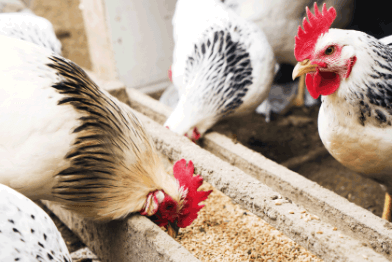How To Protect Your Flock
When you’ve invested long hours in raising your backyard birds, tips on how to protect your flock are something you’d love to know.
Besides, it’s only natural to worry about the safety of your birds – they live in your backyard and not only occupy a place in your house but also your heart.
And when we talk about ‘safety’, it doesn’t only mean protection against predators, but also from overheating, infections and diseases, adverse weather conditions, and so on.
Beware – Predators of Poultry Are on The Hunt
Predators, such as coyotes, dogs, and owls, always keep an eye out for prey – they’d actually love a chicken meal.
To keep predators away in the daylight, you can hang reflective material around your coop. The sunlight reflected from this material will deter predators.
However, this won’t work during low daylight hours. So, to protect your flock at night, you should consider replacing chicken wire with hardware cloth of half-an-inch thickness to keep the hungry animals away.
Another useful technique is using motion-detecting lights. These lights start flashing, and the alarm goes off whenever movement is sensed nearby. Most predators are simply scared off by the flashing lights.
You can also clear out any bushes or other hiding spots for the predators, along with keeping guard animals such as dogs and geese.
How To Protect Your Flock From Disease And Infections
Diseases and infections can reduce egg production, make your flock weak and even kill it – No one would wish that on their feathery friends. So, there are several things you can do to keep the diseases away.
In this regard, the health of your birds should come first. The stronger their immune system, the more resistant they'll be to diseases, and the more capable they'll be to fight off pathogens. You can ensure a healthy immune system by:
- Adding garlic cloves to the waterer.
- Feeding them bananas and berries.
- Giving them vitamin and mineral supplements.
Along with strengthening your flock's immune system, it is essential to keep any disease-causing germs away. You can do this using the following steps:
- Ensure any birds introduced to the coop are healthy and germ-free by quarantining them for at least a month.
- Employ methods to keep wild birds (that may carry germs) away.
- Wash your hands and change your shoes before entering the coop.
Protection from Adverse Weather Conditions
Too much heat and too much cold can harm your birds and make them sick. This makes it essential to protect them from extreme weather conditions.
How To Protect Your Flock From The Heat
Although chickens prefer warm temperatures, extreme heat can be harmful to them.
To keep your flock in the summer, you should make sure they have access to shady areas if the sun bothers them too much.
You should also give them fresh, cool water to drink and gently dampen their dust baths so they can twist and turn in the cool dirt.
Suppose you're in the mood to reward your feathery fellows. In that case, you can give them chilled treats, such as refrigerated berries and watermelons.
How To Protect Your Flock From The Cold
In the winter, you have to make sure your flock stays warm.
You can do this by allowing sunlight to enter their coop, so heat is trapped in their living space.
It's also a great area to let your birds decide where they want to spend their time by leaving the coop door open for some time. Some might prefer staying in the indoor heat, while others will enjoy playing in the cold.
Also, keep the doors of the coop closed during the night while also sealing any holes. This will prevent any cold air from entering the coop.
Keep Them Warm, But Don’t Overheat!
At times, you may find yourself keeping your flock a little too warm. This doesn’t let the birds ‘adapt’ to changing weather conditions and causes problems.
Plus, a ‘very warm’ coop will encourage the chickens to stay in and avoid going out in the fresh air. This will eventually affect their health in harmful ways.
Therefore, make sure you're using a calculated amount of insulation. Too little insulation will mean the temperature drops low. Too much insulation will build up moisture and cause respiratory issues.
Conclusion
Raising chickens and ducks has its benefits, but it also comes with great responsibility. Part of this responsibility revolves around the safety of your feathery fellows.
If your birds are safe, they’ll be healthy and happy. And happy and healthy birds will give you maximum benefits.
Therefore, you must know how to protect your flock. And when we say ‘protect’, we mean it in many different ways, with the most important ones discussed in this blog.

